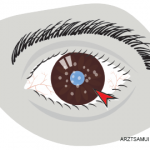 The intersection of rheumatology and ophthalmology is one in which each specialist needs to truly work well with the other to ensure proper communication and patient care, according to James Rosenbaum, MD, an expert in both fields. Dr. Rosenbaum may be the only rheumatologist in charge of an ophthalmology department. As chair of the Division of Arthritis and Rheumatic Diseases, Oregon Health & Science University, and chief of ophthalmology at Legacy Devers Eye Institute, both in Portland, he understands what he calls the “lacunae in our information” for both fields.
The intersection of rheumatology and ophthalmology is one in which each specialist needs to truly work well with the other to ensure proper communication and patient care, according to James Rosenbaum, MD, an expert in both fields. Dr. Rosenbaum may be the only rheumatologist in charge of an ophthalmology department. As chair of the Division of Arthritis and Rheumatic Diseases, Oregon Health & Science University, and chief of ophthalmology at Legacy Devers Eye Institute, both in Portland, he understands what he calls the “lacunae in our information” for both fields.
“Ophthalmologists typically don’t know a lot of about immunosuppressive medication, and on the other hand, rheumatologists typically don’t know a lot about eye disease,” Dr. Rosenbaum says. “If two physicians are equally important in the management [of eye disease], I guess it becomes a little bit like two 5-year-olds sharing a toy. Who’s in charge? Who gets what when? Who gets credit? How do you divide the responsibility?”
The answer to each of these rhetorical questions is teamwork, Dr. Rosenbaum says. And although the mantra of teamwork is preached for all situations in which subspecialists co-manage patients, he suggests it is even more important for rheumatologists and ophthalmologists because their skill sets are often vastly different.
“The rheumatologist is impaired in the sense that he or she doesn’t have the instruments to look inside the eye and know whether there is ongoing inflammation,” Dr. Rosenbaum says. “The ophthalmologist is impaired only in the sense of [their] training and approach, so that systemic medications are usually a little bit intimidating.”
One reason for the lack of knowledge on rheumatologists’ part is the change over the past few decades in how physicians are taught to approach physical exams.
“When I started medical school, we had an ophthalmoscope, and we were taught to use the ophthalmoscope. And when we made rounds and worked up a patient in internal medicine, we would do an ophthalmic exam,” Dr. Rosenbaum says. “Now, if you have a patient in the hospital and you want to look for a sign called a ‘Roth spot’ or look in the back of the eye, it’s very hard to ask anyone on the hospital floor to find an ophthalmoscope. They just don’t exist anymore. As technology has gotten better, our imaging has gotten better, our ultrasound and radiology and all kinds of diagnostic tests have gotten better, [but] our skills with the physical exam have disappeared.”


